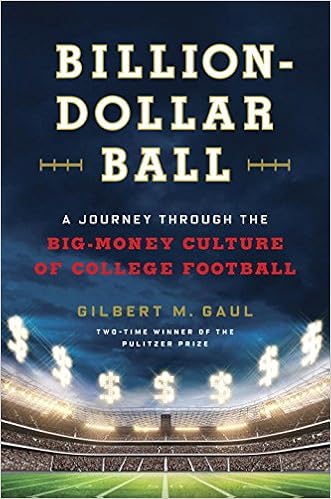Billion Dollar Ball: A Journey Through the Big-Money Culture of College Football by Gilbert Gaul was an extremely interesting book.
In Iowa, without any professional sport teams, college football is the next best thing. And our coach, Kirk Ferentz, is (too) well paid, making more than any other university employee.
My mother and I have had many discussions about the ridiculousness of this salary structure at the college level. And Gaul's book gives great data and details about what is becoming normal at big colleges: the bottom line is winning and making money.
Gaul has interviewed over two hundred people in the writing of Billion Dollar Ball, and includes a wealth of data. As I was reading I would often stop and read small snippets aloud to my husband, who is planning on reading this himself.
A few of the things I took away from this book
- there is a difference in philosophy on athletics between the big money making programs and the smaller college athletic programs. The big schools have a very small percentage of students who participate in athletics, while smaller schools not in it for the money or fame, believe that students who want to participate in athletics should have that opportunity and view it as a piece of their education.
- College football is THE moneymaker for colleges and in the past few decades has found a variety of ways to make even more money by charging extaordinary "donation fees" to long time season ticket holders. These donations are tax deductions, but since they are mandatory are not a true donation.
- Not all athletes that receive scholarships to play ball are ready or capable of college academics. Colleges provide a wealth of services to their athletes just to help them succeed in school. This is both admirable and ridiculous (in my mind at least).
- There is a huge disparity between what is spent on athletes versus students. At Texas each student athlete has $261,728 spent on them compared with $20,903 spent on students not playing a sport.
Billion Dollar Ball provides a good look at the college football industry, full of data that Gaul has collected. I enjoy sports, but I am not a true college football fan. My husband, a former college wrestler, has a different perspective on college football, enjoying it more than I do, but also participating in a lesser sport that didn't generate the income that football did. I am hoping he reads this book soon so we can hash some of it out together.
Billion Dollar Ball is a book I'd like to press into the hands of all those die-hard Iowa Hawkeye football fans. However, despite the many spot-on observations and wealth of data that Gaul provides, I am nearly certain that these fans would fall in the same category as the big money schools, believing that the bottom line is truly fame and money.

3 comments:
I think I'd enjoy that. Auburn football is huge and while I love it, I can see the problems.
I have no problem believing that statistics about the Texas Longhorn program. Here - football is king - although there are certainly other sports. I mean - look at Jordan Spieth and golf. And the swimming program is very strong and basketball (another biggie) and baseball (yet another biggie). I love football, but the salaries of the coaches are insane. Texas has turned over two big long-time coaches in the last couple of years (football and basketball) and baseball is not far behind. The newer ones are making less (I think), but not for long I'm sure. My husband might be interested in this book perhaps. He played high school football and was on his way to college ball, but had a knee injury that made that impossible.
Too bad the Football money doesn't trickle over to the academic programs. I am a huge fan of my team but I have sure noticed the difference today compared to when I was in school.
Post a Comment